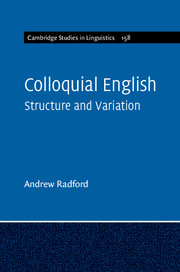2 - Topics
Published online by Cambridge University Press: 09 June 2018
Summary
Introduction
This chapter looks at the syntax of peripheral topics in colloquial English. I shall argue that colloquial English differs from more formal styles of English inmaking less use of fronted topics, and more use of dislocated and orphaned topics. I begin by looking at three different types of topic structure in §2.2. before turning to look at the derivation of topics in §2. and of multiple topic structures in §2.4. I then turn to examine the position of topics in clauses containing complementisers in §2.5, the position of topics in relation to other peripheral non-wh constituents in §2.6, the position of topics in interrogative and exclamative wh-clauses in §2.7, and the position of topics in relative clauses in §2.8. I summarise my main findings in §2.9. My overall goal in this chapter is to explore the range of positions which topics can occupy within the clause periphery, to examine how they get there, and to explore the range of clause types they can occur in: to this end, I present (and refine) a number of existing analyses.
Three Types of Topic in Colloquial English
In this section, I look at the types of topic structure found in colloquial English, and discuss ways in which topics differ from focused constituents.
In colloquial English, we find three superficially distinct types of structure containing a peripheral topic followed by a comment clause. One type involves an italicised topic associated with a gap (—) in the comment clause, as illustrated by the following examples from my broadcast English data:
(1) a. Those kind of things I love —, I really do (Andy Dillon, Talksport Radio)
b. The referee's let two or three bad tackles go, but that one, he wasn't happy with — (Gerry Armstrong, Sky Sports TV)
c. He will not start at the weekend. That, I'm sure of — (Alan Brazil, Talksport Radio)
d. You two aren't going to argue about that. That much, I do know—(David Gower, Sky Sports TV)
- Type
- Chapter
- Information
- Colloquial EnglishStructure and Variation, pp. 40 - 104Publisher: Cambridge University PressPrint publication year: 2018

